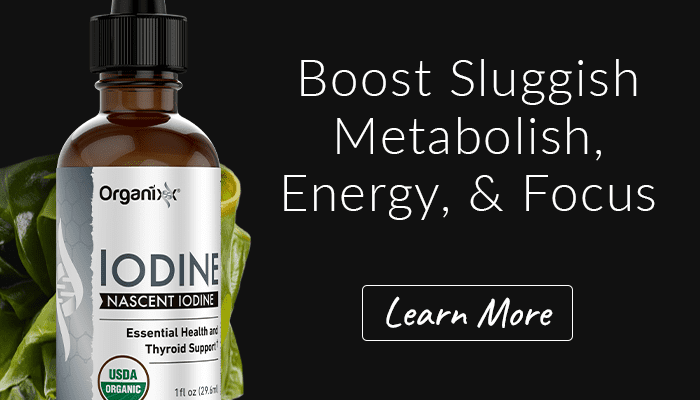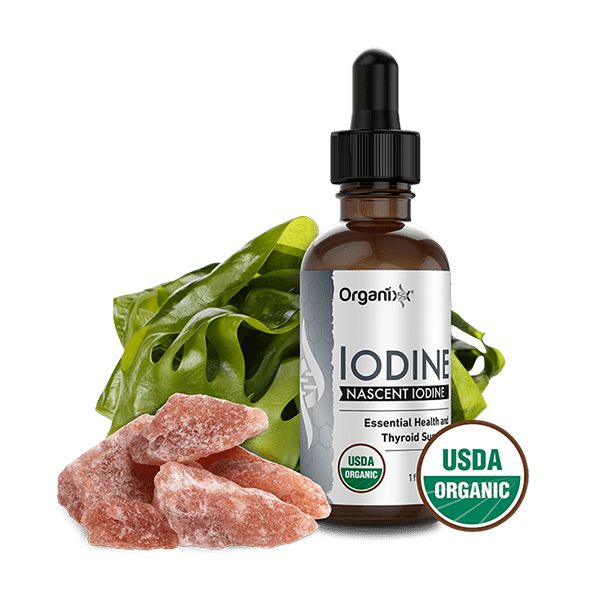Empowering you Organically – Season 3 – Episode 21
Title: A Critically Important Nutrient You Probably Don’t Think About
Hosts: Jonathan Hunsaker & TeriAnn Trevenen
Guest: N/A
Description: Ready for some FREE education? So, let’s talk about iodine. Iodine is essential for every function in your body including immune function, cardiovascular health, and metabolism. Of course, it’s instrumental for the thyroid. That’s one of the big things we talk about in connection with iodine since iodine is the foundation for thyroid hormone production. So, it’s super important.
Do you ever think about iodine? Probably not. But you probably should! We’re going to talk about iodine deficiency. We’re going to talk in general about iodine; where did it come from, why it’s important, and the different types or sources of iodine for your health. Tune in and get your learn on!
* * *
FEATURED PRODUCT
- USDA Organic Nascent Iodine
- Pure concentrated form of iodine free from additives and toxins
- Each drop loaded with 650 micrograms of bioavailable iodine
- Sourced from 300-million-year-old salt deposits
- Screened for radiation to ensure purity & safety
- Delivered in hydrating all-natural organic vegetable glycerin
- Can also be used externally as a disinfectant and antiseptic
Iodine The fact is that iodine is utilized for just about every function in your body. Yet many people are unaware of their body’s need for iodine, and that iodine deficiency has reached epidemic proportions worldwide.
History of Iodine
- Iodine was discovered in 1811
- Iodine actually became the first modern medical treatment.
- It was the first time in medicine that one remedy was used to treat one disease, and that was when iodine was used to treat goiters.
- Iodine eventually became one of the primary antibiotics.
- It was used orally as an antibiotic—it was used topically as an antibiotic.
- Still today, we do use iodine in surgical rooms. We use it to paint over surgical wounds and things like that to make sure that they don’t get infected.
Why Optimal Levels of Iodine Matters
- Iodine deficiency has multiple adverse effects on growth and development, and is the most common cause of preventable mental retardation in the world.
- Iodine deficiency disorders result from inadequate thyroid hormone production secondary to insufficient iodine.
- During pregnancy and early infancy, iodine deficiency can cause irreversible effects.
10 Signs & Symptoms of an Iodine Deficiency
- Swelling in the Neck – Swelling in the front of the neck, or a goiter, is a common symptom of an iodine deficiency. It occurs when your thyroid gland is forced to make thyroid hormones when there is a low supply of iodine in the body.
- Unexpected Weight Gain – Low iodine levels may slow your metabolism and encourage food to be stored as fat, rather than be burned as energy. This may lead to weight gain. 3. Fatigue and Weakness – Low iodine levels may leave you feeling tired, sluggish and weak. This is because your body needs the mineral to make energy.
- Hair Loss – An iodine deficiency may prevent hair follicles from regenerating. Fortunately, getting sufficient iodine can help correct hair loss that occurs due to an iodine deficiency.
- Dry, Flaky Skin – Dry, flaky skin may occur with an iodine deficiency, as the mineral helps your skin cells regenerate. It also helps your body sweat and hydrates your skin cells, so an iodine deficiency can cause you to sweat less.
- Feeling Colder Than Usual – Iodine helps generate body heat, so low levels of it may leave you feeling colder than usual.
- Changes in Heart Rate – An iodine deficiency may slow your heart rate, which may leave you feeling weak, fatigued, dizzy and at risk of fainting.
- Trouble Learning and Remembering – An iodine deficiency at any age may cause you to struggle to learn and remember things. One possible reason for this might be an underdeveloped brain.
- Problems During Pregnancy – Getting enough iodine is especially important for pregnant and breastfeeding women, as they have higher needs. An iodine deficiency may cause severe side effects, especially for the baby, such as stunted growth and brain development.
- Heavy or Irregular Periods – Some women with an iodine deficiency may experience heavy or irregular periods. This is because low thyroid hormone levels may interfere with hormones that are involved in regulating the menstrual cycle.
Different Kinds/Sources of Iodine
Salt
- The addition of iodine to the U.S. salt supply started in the 1920s in response to a government health mandate. During that time, up to 40% of the population of the upper Midwest and Great Lakes region suffered from goiters and other thyroid diseases caused by extreme iodine deficiency . [Note: a goiter is an enlarged thyroid gland that results in a swelling of the neck.] ● Adding iodine to table salt did help with the goiter epidemic, but that was about it. Nonetheless, it became the foundation upon which the U.S. RDA, or Recommended Daily Allowance (now called the Recommended Daily Intake, or RDI) was built.
- Today, the RDI for iodine is 150 mcg/day for an adult and 220 mcg/day for a pregnant woman. This amount may stop goiters, but it’s not enough for all the iodine needs of the body. ● In order to make salt white and help it last longer, most manufacturers use a bleaching process. This adds dangerous halides such as chlorine and bromide to the mix, which block the body’s absorption of iodine. In addition, other chemicals are often added to the salt, including manufactured iodide, sodium solo-co-aluminate, fluoride sodium bicarbonate, anti-caking agents, and aluminum derivatives.
- If you are going to sprinkle salt on your food, most health experts suggest Himalayan pink salt or Celtic sea salt, which contains trace amounts of naturally-produced iodine as well as other essential minerals.
Food – Some foods are…
- Seaweed, sea food, fish, eggs, spinach, dairy, strawberries, and cranberries.
- Food alone is not enough due to the depletion of nutrients in the soil, as well as an increasing toxic load, has changed the amount of essential nutrients available in the foods we eat.
Potassium Iodine Tablet
- Potassium and sodium are often part of the picture because they act as carriers for iodine that the human body can safely absorb.
- Iodine in its natural state is unstable and even dangerous.
- Scientists discovered a while ago that combining potassium with iodine to form potassium iodide can create a more stable form, which can be absorbed by the body.
- The downside regarding potassium iodine for everyday use is that only about 20% of this kind of iodine can be assimilated by the body.
Alcohol-Based vs Glycerin-Based The advantage of using a liquid for iodine transport is that it becomes more bioavailable to the body.
Alcohol based, however, is not the preferred method of liquid transport for several reasons.
- Most alcohol used for supplements are simple ethanol or grain alcohols, the same kind that the bartender puts in your favorite martini – not appropriate for children, pets, and those with high blood pressure or recovering from alcoholism.
- almost all alcohols are made with genetically-modified corn
- acts as a drying agent
Glycerin – (also known as glycerine, glycerol, or glycerite) has many advantages – that is, if you can find the right kind.
- Most commercial glycerin-based products, like commercial soaps, are sourced through animal products. A better option is vegetable-based glycerin. And the best of all is organic, non- GMO glycerin that is not made from soy or corn.
- Retains moisture
- Is antiseptic – good for burn salve
- Won’t upset blood sugar levels
- Provides more stable shelf life
Nascent Iodine – is also known as atomic iodine, monatomic iodine, Atomidine, or colloidal iodine. The term “nascent” refers to iodine that has an incomplete number of electrons. This gives it an electrical charge, according to a report conducted by the non-profit Weston Price Foundation and others.
- Many forms of dietary iodine break down into iodide in the digestive tract. In this state, iodine-dependent organs like the thyroid and reproductive organs cannot use it. The charge of nascent iodine helps it stay intact and absorb quickly and thoroughly into the organs that need it most.
* * *
Subscribe to Empowering You Organically
Never miss an episode!
APPLE PODCASTS SPOTIFY GOOGLE PODCASTS
–
Episode 21 – A Critically Important Nutrient You Probably Don’t Think About





